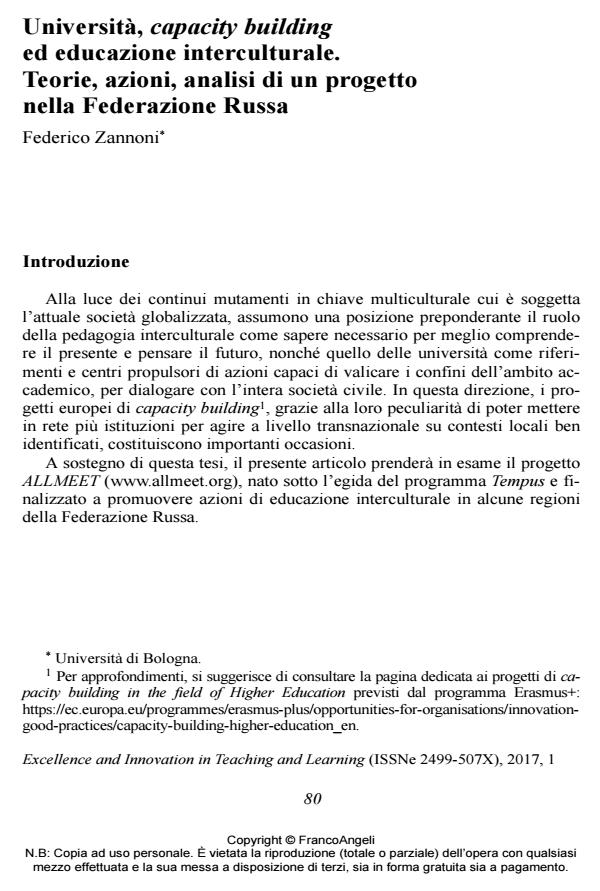Universities, Capacity Building and Intercultural Education. Theories, Actions, Analysis of a Project in the Russian Federation
Journal title EXCELLENCE AND INNOVATION IN LEARNING AND TEACHING
Author/s Federico Zannoni
Publishing Year 2017 Issue 2017/1 Language Italian
Pages 15 P. 80-94 File size 167 KB
DOI 10.3280/EXI2017-001005
DOI is like a bar code for intellectual property: to have more infomation
click here
Below, you can see the article first page
If you want to buy this article in PDF format, you can do it, following the instructions to buy download credits

FrancoAngeli is member of Publishers International Linking Association, Inc (PILA), a not-for-profit association which run the CrossRef service enabling links to and from online scholarly content.
Currently more than 190 ethnic groups live in the Russian Federation. The exponential increase of xenophobia, nationalism and Islamophobia has highlighted the crucial importance of the management of multiculturalism dynamics, but the political, administrative and cultural Russian institutions still appear unprepared. The ALLMEET project, funded under the European Tempus program, wants to enhance and strengthen the role of universities as leading institutions to the widespread dissemination of the principles of the intercultural education, addressing not only to students and researchers, but to all the population, planning and promoting actions in synergy with civil society. The analysis of this project allows to demonstrate clearly the links that exist between the concepts and practices of intercultural education, capacity building, lifelong learning and internationalization of universities. The intent is to show how universities should take a propulsive role to promote actions that focus on these concepts and practices, involving other institutions and projecting purposes and results far beyond the walls of their rooms.
Keywords: Intercultural education; capacity building; Russia; lifelong learning; internationalization; globalization.
- Affergan, F. (1991). Esotismo e alterità. Milano: Mursia.
- Alexseev, M. A. (2015). A New Wave of Russian Nationalism? What Really Changed in Public Opinion after Crimea. PONARS Eurasia Policy Memo, 362, 1-9.
- Barrett, M., Byram, M., Lázár, I., Mompoint-Gaillard, P., & Philippou, S. (2014). Developing Intercultural Competence through Education. Strasbourg: Pestalozzi Series No. 3, Council of Europe Publishing.
- Bauman, Z. (2006). Paura liquida. Roma-Bari: Laterza.
- Burr, V. (2003). Social Constructionism. East Sussex: Routledge.
- Cambi, F. (2001). Intercultura: fondamenti pedagogici. Roma: Carocci.
- Davies, B. & Harré, R. (1990). Positioning: The Discorsive Production of Selves. Journal for the Theory of Social Behaviour, 20 (1), 43-63.
- Deardorff, D. K. (2006). The Identification and Assessment of Intercultural Competence as a Student Outcome of Internationalization at Institutions of Higher Education in the United States. Journal of Studies in International Education, 10, 241-266.
- Eade, D. (1997). Capacity-Building. An Approach to People-Centered Development. Oxford: Oxfam Publications.
- Fabietti, U. (2013). L’identità etnica. Storia e critica di un concetto equivoco. Roma: Carocci.
- Filippini, F., Genovese, A., & Zannoni, F. (2010). Fuori dal silenzio. Volti e pensieri dei figli dell’immigrazione. Bologna: Clueb.
- García, J. A. (1994). La educación intercultural en los ámbitos no formales. Revista de estudios sociales y sociología aplicada, Documentación social, 97, October-December, 147.
- Genovese, A. (2003). Per una pedagogia interculturale. Bologna: Bonomia University Press.
- Guitton, J. & Lanzmann, J. (1995). Quello che credeva al cielo e quello che non ci credeva. Milano: Gribaudi.
- Kuznetsova-Morenko, I., Humphries, H., Conrad, B., & Salakhatdinova, L. (2006). New Ethnic Identity: The Islamization Process in the Russian Federation. In Kukreja, S. (Ed.), Case Studies in Political Sociology. New Deli: Serial Publications.
- La Cecla, F. (2009). Il malinteso. Antropologia dell’incontro. Roma-Bari: Laterza.
- Malakhov, V. S. (2014). Integraciya migrantov: evropejskij opyt i perspektivy Rossii: rabochaya tetrad [Integration of Migrants: European Experience and Russian Prospects: Workbook]. Moscow: Speckniga.
- McLuhan, M. & Fiore, Q. (1968). War and Peace in the Global Village. New York: McGraw-Hill.
- Minkler, M. & Wallerstein, N. (2005). Improving Health through Community Organization and Community Building: A Health Education Perspective. In Minkler, M. (Ed.), Community Organizing and Community Building for Health. New Bruns-wick, NJ: Rutgers University Press.
- Mukomel, V. I. (2009). Ksenofobiya i nasilie v Rossii: sovremennye i gryadushhie vyzovy [Xenophobia and Violence in Russia: Current and Future Challenges]. Vestnik Instituta Kennana v Rossii, 16, 29-34.
- Mukomel, V. I. (2014). Ksenofobiya i migrantofobiya v kontekste kultury doveriya [Xenophobia and Migrant-phobia in the Context of a Culture of Trust]. Mir Rossii, 1, 137-166.
- Pain, E. (2014). Ksenofobiya i nacionalizm v epoxu rossijskogo bezvremenya [Xenophobia and Nationalism in an Era of Russian Timelessness]. Pro et Contra, 62 (1-2), 34-53.
- Poltaradneva, E. V. (2011). Problema ksenofobii v sovremennom rossijskom obshhestve: dinamika i aktualnoe sostoyanie [The Problem of Xenophobia in Russian Society: Dynamics and Current State]. Vestnik SamGU, 85, 40-46.
- Prina, F. (2011). Homogenisation and the “New Russian Citizen”: A Road to Stability or Ethnic Tension. Journal on Ethnopolitics and Minority Issues in Europe, 10 (1), 53-93.
- UNESCO (1992). International Conference on Education, 43rd Session, The Contribution of Education to Cultural Development. Paris: Unesco International Bureau of Education. Retrieved from http://www.unesco.org/education/pdf/31_42.pdf.
- UNESCO (2006). Guidelines on Intercultural Education. Paris: UNESCO. http://unesdoc.unesco.org/images/0014/001478/147878e.pdf.
- United Nations Committee of Experts on Public Administration (2006). Definition of Basic Concepts and Terminologies in Governance and Public Administration. New York: United Nations Economic and Social Council. Retrieved from http://unpan1.un.org/intradoc/groups/public/documents/un/unpan022332.pdf.
- Zannoni, F. (a cura di). (2012). La società della discordia. Prospettive pedagogiche per la mediazione e la gestione dei conflitti. Bologna: CLUEB.
- Zannoni, F. (2015). La Russia che ci rappresentiamo, tra ignoranza ed esotismo. Educazione interculturale, 13 (2), 1-12.
Federico Zannoni, Università, capacity building ed educazione interculturale. Teorie, azioni, analisi di un progetto nella Federazione Russa in "EXCELLENCE AND INNOVATION IN LEARNING AND TEACHING" 1/2017, pp 80-94, DOI: 10.3280/EXI2017-001005